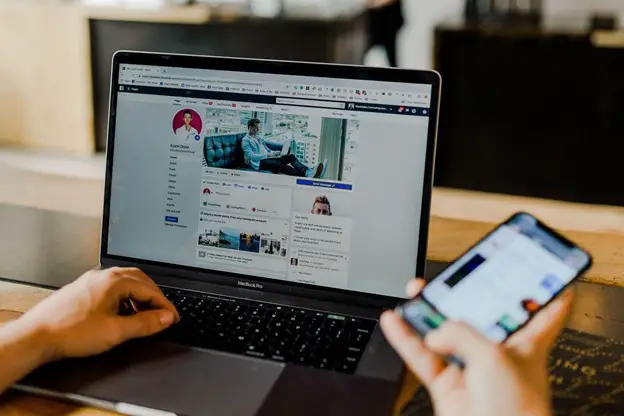Does Social Media Cause Depression? How to Solve it?

The Internet was first invented to share information for military purposes, but today, who would have thought that the internet would grow up to this extent. Social media has made the impossible turn possible — connecting the whole world together and allowing you to communicate with the whole world from a small corner of your room.
As parents, we cannot help but worry about our children who are fully dependent on social media. Social media is both a boon and a bane, especially for kids. We were one of the lucky generations where we could experience life without the internet and life with the internet. But today’s generation has no other ways to avoid the internet and social media.
Social media brought up depression that was not so much of a big deal in the past. But today, depression has increased in large amounts, and one of the reasons for it is the internet and social media.
The Social Media and Depression
One of the weaknesses of today’s generation is they love communicating with people online rather than interacting in person. Even though many youngsters know that social media is not suitable for their health, they still cannot avoid it. So what is the role of social media in mental health? Let’s discuss it below:
A human being cannot survive alone; we need each other’s companionship and support. The more people connect, the more they feel happier, stress-free. Similarly, when younger people have such an easier platform, they will try to connect with people.
However, while more social interaction reduces tension, this is not the case for social media. According to the Journal of Psychological and Clinical Psychology, social media harms a person’s mental health. According to the report, even reducing the social network time by half a minute per day will improve an individual’s health.
Social media such as Facebook, Instagram, Snapchat, Twitter, and many more help to upload Images, likes, comments and messages. However, these characteristics are the source of depression. Younger people compare their own lives to the lives of others, believing that other people’s lives are filled with fun and joy when their own lives are empty.
The Negative Aspect of Social Media
Younger people are more prone to negative aspects of social media. Children cannot differentiate between the virtual world and the real world. And often confuse social media as a real-world which brings negative effects and impacts to them. Let’s know some of the negative impacts of social media:
1. Low Self Esteem
When you see beautiful people all around social media, you will somewhat feel inadequate and insecure. Generally, teenagers are particularly affected by believing that everyone around them is attractive except them, leading to a decrease in children’s self-esteem. People begin to compare themselves to looks, clothing, diets, and even relationships.
The younger people seem to be insecure about
- height,
- weight,
- appearance,
- colors,
- talents,
- clothing,
Teenagers are the most affected age group since they compare their lifestyle, relationship, and other aspects of their lives to those they see on social media.
Most teens try to imitate celebrities and models that they see on social media. They start admiring their flawless photoshop makeup photos. Then they attempt to replicate the appearance by dieting and applying cosmetics and makeup. The worst is that they try to live the lives of celebrities and models while hating their own life.
Similarly, young people blame their parents and others, which lead to disputes with parents. When one’s self-esteem is harmed, they see all that is beautiful and positive in others’ lives and see flaws in their own life.
2. Isolation
One of the negative causes of social media is feeling lonely and isolated. If your child prefers social media interaction rather than a face-to-face meeting, this usually leads to isolation. People on social media only highlight the positive part of their lives while concealing the negative part.
Your child won’t be able to maintain a healthy relationship with your friends if they start to feel insecure and envious of them. Not only that, they won’t be able to bloom a new relationship too. Also, children may complain to their parents about their needs, money, by comparing with others in social media which leads to arguments and, ultimately leading to loneliness and isolation.
3. Depression and Anxiety
The more people use social media, the higher their emotions get. For instance, you might have noticed that people who share stories and photos on Facebook are more interested in seeing how many shares, views, and followers they have. When they compare those with their famous friends, they experience more negative emotions such as sadness, frustration, anxiety.
Some depressed people take support of social media which eventually makes their condition worse. The more social media usage, the more amount of sadness, envy, jealousy, and loneliness haunts you, which eventually leads to depression.
Depression can happen from a child to an adult, but often negligence of depression causes even more severe problems and consequences.
Another issue is anxiety. When you are using the internet too much, you will find it challenging to communicate with people face to face. This creates a habit where you are not able to express yourself and may face
- Lack of confidence,
- nervousness,
- sweating,
- blushing,
- panic attacks eventually when you try to face people with people face to face.
4. Sleep Deprivation
According to Sage Journals, about 60% of adolescents check their phones before going to bed and after waking up, and the majority of them scroll for about an hour.
Let’s imagine your children are about to go to bed and want to spend a minute on Facebook, but that minute stretches into an hour, and they are still not done.
This causes younger people to feel exhausted, stressed, and unable to get up early in the morning or sleep well, resulting in sleep loss, depression, and insomnia. Further, it affects schools and colleges.
5. Cyberbullying
Cyberbullying is one of the common problems due to social media and the internet. Cyberbullying is a form of bullying that occurs online. While cyberbullying has made it easier to harass each other, people love to post pictures, videos, and comments in each other’s posts, but it doesn’t go well.
When people’s opinions and views differ from each other, negative emotions strike back. They try to humiliate, threaten other parties through comments and messaging, which leads to gossip, bullying, spreading hate, and many more.
When a person cannot avoid being abusive, hateful, and threatening, cyberbullying gets worse. These also affect mental health and social wellbeing, and in extreme cases, can lead to depression or even suicide.
6. Lack of Concentration
When a student cannot study, you know what happens next. Younger people are naturally attracted to entertaining activities rather than study. And when social media is involved, they get so addicted to social media and the internet that they cannot think about anything else.
Because of spending hours and hours on browsing social sites, lack of concentration is seen which leads to poor performance or inferior academic markings. Again other than this, when the mind is not used correctly the mind becomes dull.
7. Less Healthy Activity
Too much sitting and watching the screen affects physical health. The less physical activity, the more chances of health problems such as
- headaches,
- tremors,
- incorrect posture,
- muscle problems, and many more.
The more screen you look at, the more strain you put on your eyes, leading to vision issues.





